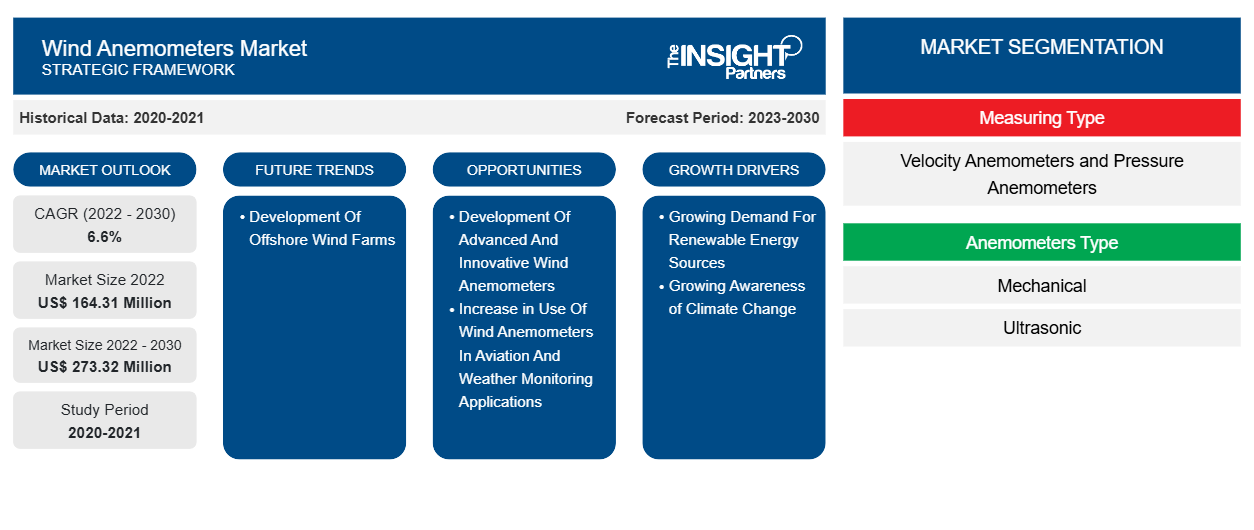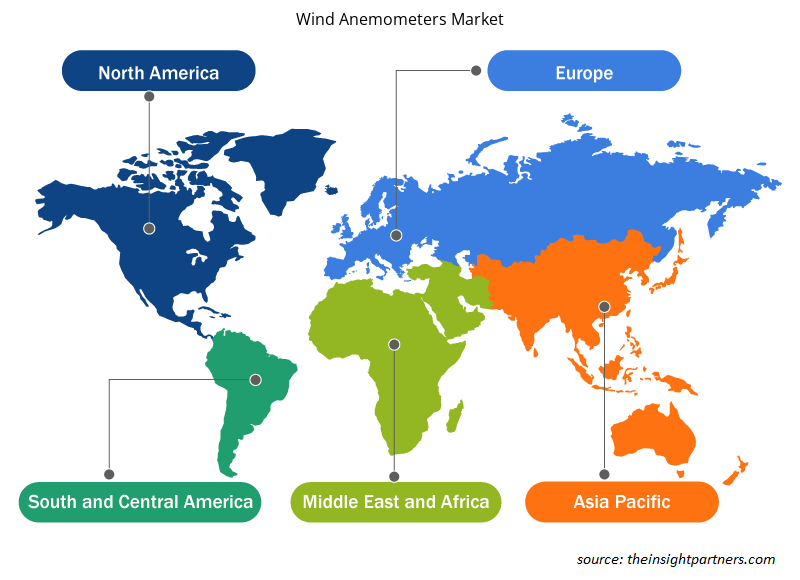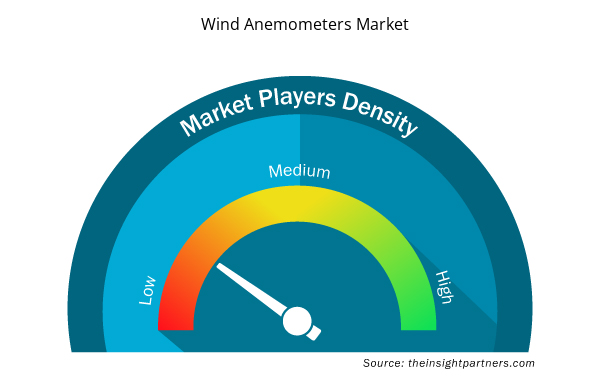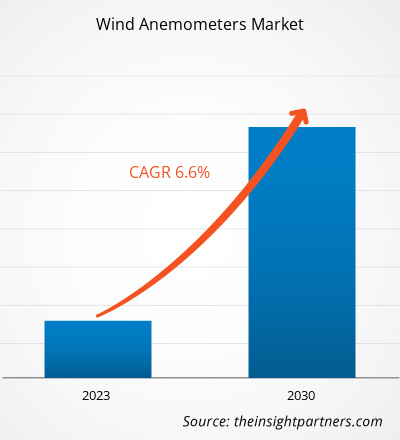[Research Report] The wind anemometers market size was valued at US$ 164.31 million in 2022 and is expected to reach US$ 273.32 million by 2030. The wind anemometers market is expected to record a CAGR of 6.6% from 2022 to 2030.
Analyst Perspective:
Anemometers are widely used at all weather stations, ranging from the frigid Arctic to humid equatorial areas. The wind's speed helps indicate a change in weather patterns, for instance, approaching storms. It is significant for climatologists, engineers, and pilots. Several companies operating in the wind anemometers market are launching new devices to measure wind. For instance, in June 2023, UK-based sensor manufacturer Gill Instruments launched a new dual-axis ultrasonic anemometer (Windultra) for measuring wind direction and speed. It is designed for use in various marine or land applications. WindUltra's rapid installation and alignment features include a choice of two-pole mounts, either a twist-lock 1 in (25–26 mm) pole mount or 1.75-2 in (44–51 mm) band-clamp pole mount.
Wind Anemometers Market Overview:
A wind anemometer measures the speed of the wind and its pressure. To study weather patterns, these instruments are essential tools for meteorologists. These devices are used by physicists while studying the movements of air. Different manufacturing companies worldwide offer various anemometer instruments in industries such as HVAC, marine, wind power, construction, and aerospace. Additionally, for air velocity or wind, different types of anemometers are used for multi-functionality, including temperature and humidity. Based on type, these also possess data recording or logging functionality to take long-term dimensions in a certain period. There are several benefits of wind anemometer, such as high precision and low power utilization. Using only a single device, the user can measure multiple parameters such as speed, velocity, direction, and pressure of the wind.
Customize This Report To Suit Your Requirement
You will get customization on any report - free of charge - including parts of this report, or country-level analysis, Excel Data pack, as well as avail great offers and discounts for start-ups & universities
Wind Anemometers Market: Strategic Insights

- Get Top Key Market Trends of this report.This FREE sample will include data analysis, ranging from market trends to estimates and forecasts.
You will get customization on any report - free of charge - including parts of this report, or country-level analysis, Excel Data pack, as well as avail great offers and discounts for start-ups & universities
Wind Anemometers Market: Strategic Insights

- Get Top Key Market Trends of this report.This FREE sample will include data analysis, ranging from market trends to estimates and forecasts.
Wind Anemometers Market Driver:
Growing Demand for Renewable Energy Sources Drives Wind Anemometers Market Growth
The growth of renewable energy sources, particularly wind power, substantially impacts the wind anemometers market. According to the International Energy Agency (IEA), in 2022, renewable energy supply from wind, solar, hydro, geothermal, and ocean increased by close to 8%, and the share of these technologies in the total global energy supply increased by approximately 0.4%, reaching 5.5%. Also, the amount of electricity generated by wind increased by 265 TWh (an increase of 14%), the second-largest growth of all power generation technologies. Wind remained the leading renewable technology, generating over 2100 TWh in 2022.
Governments of various countries are taking initiatives to increase wind farms, including wind power. For instance, in May 2023, ITOCHU Corporation announced that ITOCHU and Hitachi Zosen Corporation have begun preparations for the development and operation of an onshore wind farm in an area facing the Pacific Ocean in Rokkasho Village, Kamikita District, Aomori Prefecture and by following the incorporation of Mutsu Ogawara Wind Power LLC, it produces the electricity. The design and construction of this onshore wind farm project is aimed to start in April 2026. Similarly, in June 2023, the world's biggest floating wind farm was launched off the west coast of Norway. Equinor, with 88 megawatts (MW) of capacity, will generate energy to supply nearby oil and gas platforms. Wind turbines have very advanced features to maintain efficiency and safety. The wind anemometer constantly measures wind speed and transfers the data to the wind turbine's controller, which controls the rotor at a safe speed. Wind anemometers are essential instruments used in the wind energy industry. Hence, the growing renewable energy sources will further propel the wind anemometers market growth.
Wind Anemometers Market Segmental Analysis:
Based on anemometers type, the wind anemometers market is segmented into mechanical, ultrasonic, and others. The mechanical segment held the largest share of the wind anemometers market in 2022. The ultrasonic segment is expected to register the highest CAGR in the wind anemometer market. A mechanical anemometer contains a wheel with a propeller or cups at the end of the wheel's spokes. One of the cups contains a magnet; each time the magnet passes a switch, it makes a recording. The recording by the mechanical anemometer gives an extremely accurate reading of the wind speed. Types of mechanical anemometers are cup anemometers, vane anemometers, and others. A cup anemometer consists of four hemispherical cups attached to one end of the horizontal arms at equal angles on a vertical shaft. The positioning of the cups is such that the air passes through them in the horizontal direction, making the cup's rotation proportional to the speed of the wind. Several schools across various countries are mounting the instruments for weather stations designed as per standards fixed by the India Meteorological Department (IMD).
Wind Anemometers Market Regional Analysis:
The North America wind anemometers market size was valued at US$ 59.65 million in 2022 and is projected to reach US$ 102.06 million by 2030; it is expected to register a CAGR of 6.9% from 2022 to 2030. The North America wind anemometers market is segmented into the US, Canada, and Mexico. The US held the largest share of the wind anemometers market in North America in 2022. The renewable sources of energy in the US are increasing significantly. According to the Regents of the University of Michigan, the US wind industry installed 13,413 megawatts (MW) of new wind capacity in 2021, carrying the cumulative total to 135,886 MW. This is the second-highest wind capacity installed in one year, representing US$ 20 billion of investment. Wind provides more than 9% of electricity nationwide, over 50% in South Dakota and Iowa, and over 30% in Oklahoma, Kansas, and North Dakota. In 2022, renewable energy sources reported ~13.1% of US primary energy consumption. Renewable energy sources accounted for approximately 21.5% of total utility-scale electricity generation. Wind anemometers are widely used to measure wind speed and transmit wind speed data to the controller. Hence, with the growing renewable energy sources, the demand for wind anemometers is increasing significantly in the country.
Wind Anemometers Market Key Player Analysis:
LSI LASTEM Srl, Campbell Scientific Inc, Vaisala Oyj, R M Young Co, OTT HydroMet Fellbach GmbH, Gill Instruments Ltd, Adolf Thies GmbH & Co KG, Theta Instruments Co Ltd, Lambrecht meteo GmbH, Bristol Industrial & Research Associates Ltd, and METEK Meteorologische Messtechnik GmbH are among the key players operating in the wind anemometers market.
Wind Anemometers Market Regional Insights
The regional trends and factors influencing the Wind Anemometers Market throughout the forecast period have been thoroughly explained by the analysts at Insight Partners. This section also discusses Wind Anemometers Market segments and geography across North America, Europe, Asia Pacific, Middle East and Africa, and South and Central America.

- Get the Regional Specific Data for Wind Anemometers Market
Wind Anemometers Market Report Scope
| Report Attribute | Details |
|---|---|
| Market size in 2022 | US$ 164.31 Million |
| Market Size by 2030 | US$ 273.32 Million |
| Global CAGR (2022 - 2030) | 6.6% |
| Historical Data | 2020-2021 |
| Forecast period | 2023-2030 |
| Segments Covered |
By Measuring Type
|
| Regions and Countries Covered | North America
|
| Market leaders and key company profiles |
Wind Anemometers Market Players Density: Understanding Its Impact on Business Dynamics
The Wind Anemometers Market is growing rapidly, driven by increasing end-user demand due to factors such as evolving consumer preferences, technological advancements, and greater awareness of the product's benefits. As demand rises, businesses are expanding their offerings, innovating to meet consumer needs, and capitalizing on emerging trends, which further fuels market growth.
Market players density refers to the distribution of firms or companies operating within a particular market or industry. It indicates how many competitors (market players) are present in a given market space relative to its size or total market value.
Major Companies operating in the Wind Anemometers Market are:
- LSI LASTEM Srl
- Vaisala Oyj
- R M Young Co
- Gill Instruments Ltd
- Adolf Thies GmbH & Co KG
Disclaimer: The companies listed above are not ranked in any particular order.

- Get the Wind Anemometers Market top key players overview
Recent Developments:
Inorganic and organic strategies such as mergers and acquisitions are highly adopted by companies in the wind anemometers market. A few recent key wind anemometers market developments are listed below:
- In 2023, Gill Instruments Ltd introduced WindUltra, a 2-axis anemometer. The product offers high performance combined with toughness, compact design, and rapid installation and alignment features while still delivering the high-accuracy ultrasonic wind speed and direction sensing that Gill is renowned for.
- In 2022, METEK acquired business areas of Theodor Friedrichs GmbH & Co. The products of Theodor Friedrichs GmbH & Co. include conventional sensor technology, the widely used data logger type Combilog, and a variety of test chambers.
- Historical Analysis (2 Years), Base Year, Forecast (7 Years) with CAGR
- PEST and SWOT Analysis
- Market Size Value / Volume - Global, Regional, Country
- Industry and Competitive Landscape
- Excel Dataset


- Identity Verification Market
- Airport Runway FOD Detection Systems Market
- Unit Heater Market
- Embolization Devices Market
- Semiconductor Metrology and Inspection Market
- Online Exam Proctoring Market
- Predictive Maintenance Market
- Oxy-fuel Combustion Technology Market
- Real-Time Location Systems Market
- Vision Care Market

Report Coverage
Revenue forecast, Company Analysis, Industry landscape, Growth factors, and Trends

Segment Covered
Measuring Type, Anemometers Type, and Application

Regional Scope
North America, Europe, Asia Pacific, Middle East & Africa, South & Central America

Country Scope
This text is related
to country scope.
Frequently Asked Questions
What is the estimated global market size for the global wind anemometer market in 2022?
The global wind anemometer market was estimated to be valued at US$ 164.31 million in 2022 and is projected to reach US$ 273.32 million by 2030 it is expected to grow at a CAGR of 6.6% during 2022–2030.
What will be the global wind anemometer market size by 2030?
The global wind anemometer market is expected to reach US$ 273.32 million by 2030.
Which key players hold the major market share of the global wind anemometer market?
The key players holding majority shares in the global wind anemometer market include Enercorp Instruments, FT Technologies, Gill Instruments Limited, Vaisala and METEK Meteorologische Messtechnik GmbH.
Which regions are registering a high growth rate during the forecast period?
The country anticipated to grow with the highest CAGR are North America and Europe.
What are the future trends of the global wind anemometer market?
Development of offshore wind farms is expected to drive the growth of the global wind anemometer market in the coming years.
What are the driving factors impacting the global wind anemometer market?
Growing demand for renewable energy sources and growing awareness of climate change are the driving factor for the global wind anemometer market
Which is the fastest-growing region market?
APAC is anticipated to grow with the highest CAGR over the forecast period.
Trends and growth analysis reports related to Electronics and Semiconductor : READ MORE..
The List of Companies - Wind Anemometers Market
- LSI LASTEM Srl
- Vaisala Oyj
- R M Young Co
- Gill Instruments Ltd
- Adolf Thies GmbH & Co KG
- Theta Instruments Co Ltd
- Lambrecht meteo GmbH
- METEK Meteorologische Messtechnik GmbH
- Bristol Industrial & Research Associates Ltd
- Campbell Scientific Inc
- OTT HydroMet Fellbach GmbH

 Get Free Sample For
Get Free Sample For